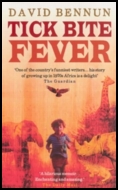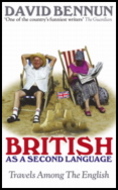| Text to separate 1 |  | Text to separate |  |
| Text to separate 1 | Tick Bite Fever | Text to separate | British As A Second Language |
|
Available now from Ebury Press:
British As A Second Language More details here Click here to buy it Also published by Ebury: Dave's highly acclaimed African memoir Tick Bite Fever |
| Television Reviews for Sunday 28th December [The Mail On Sunday, 2003] GALILEO'S DAUGHTER Channel 4, Monday ** PROMOTED TO GLORY ITV1, Sunday *** MONKEY DUST BBC3, Saturday **** IN KEEPING with tradition, this year's Christmas schedules were thin enough to make their mother sick with worry. Which is odd, when you consider how much turkey has been stuffed into them. One thing I did look forward to reviewing was Louis And The Nazis, featuring Louis Theroux and some Nazis. The BBC sent me a tape which showed neither, but produced only a nice, calming blue screen. Was this an oblique post-modern statement of some kind? A misplaced tribute to the late film-maker Derek Jarman? A conspiracy by supporters of rival nutjob-botherer Jon Ronson? I currently favour the “cock-up” theory. Anyway, by then the actual broadcast had come and gone. So no Louis, no Nazis. I'm guessing he was faux-innocent and they were unpleasant. I turned instead to Galileo's Daughter. “400 years ago,” ran the narration, atop a portentous chorale, “the Inquisition forced strict adherence to Catholic dogma. Heretics often endured violent punishment. Among those at risk was. . .” - and here I paraphrase slightly - “. . . Simon Callow, equipped with the least convincing beard this side of Mrs. Elton John.” Galileo's Daughter was yet another example of how, in history docudramas, the drama overshadows rather than illuminates the doc. Callow gave a performance of prime, honey-glazed gammon, as if Galileo had himself possessed every actorly mannerism in a seasoned stager's orotund repertoire. There were moments when the great scientist seemed on the brink of delivering an encomium to Mr Kipling's cakes (“Not only are they exceedingly good, but they will hit the ground at the same time as this cannonball.”) As for the daughter, she proved a mere gimmick, a MacGuffin, despite awkward attempts to prod her into the spotlight every so often. She may have been an interesting individual in her own right, but for all her historical significance, the title could have been “Galileo's Barber” or “Galileo's Cousin, Steve, Who Only Saw Him On Birthdays”. What mattered here was Galileo's perilous struggle to promulgate the Copernican theory of the universe, bringing him into conflict with his former friend, Pope Urban, whom I like to picture in baggy, low-slung vestments, with his mitre on back-to-front. As much as for his specific discoveries, we are indebted to Galileo for promoting empiricism; the position - embattled now as then - that in science, experiment and evidence are paramount. You wouldn't have known it from watching Callow audition for the next Tolkein adaptation. Such shows invariably remind me that the outstanding history programme of recent years, Ken Burns' 1990 series on the American Civil War, ran for 11 evocative hours without a single dramatic reconstruction. The civil war provides the setting for Ambrose Bierce's marvellous short story, An Occurrence At Owl Creek Bridge. If you're going to nick a premise, and its attendant shock ending, you can't do much better than that one. I wouldn't want to spoil anyone's pleasure in reading it for the first time; suffice to say the twist worked for Bierce, but not in Promoted To Glory, because Bierce told the whole tale from a single point of view. Promoted to Glory followed the longstanding romantic formula: unlikely charmer aims to win object of ardour before she chains herself in wedlock to humourless stiff. What distinguished it was its backdrop - the Salvation Army, depicted with honest affection - and the superb Ken Stott. His easy naturalism in the lead role, that of an alcoholic tramp redeemed by love, lit up some fairly predictable dialogue like Blackpool tower. Credit should go to all involved for trying something different. Over the whole affair hung the surprisingly benign shade of Dennis Potter. This brief glimpse emphasised how thoroughly the spirit of Britain's most original TV screenwriter has been stifled everywhere else. The most disturbing “comedy” programme in living memory was made by one of this country's very few broadcasters of genius: Chris Morris. I'm not referring to the Brass Eye paedophilia special, but to Jam, a show so deeply upsetting that several Morris fans I know refused to watch it. Jam now has a successor, similar in mood (dreamlike, cruel, eerie), but easier on the eye and brain. Monkey Dust is a nimble, itchy-triggered little guerilla unit of an animated sketch show. It offers the first plausible answer to the question, “What is BBC3 for?” It's also a definitively dystopian portrait of the UK, far more effective in that capacity than Little Britain, which is often funny, but stretches any claim to be more than character comedy. The first series of Monkey Dust tended to blaze away at the slightest rustle in the foliage. Watching the entire second series back-to back, it seemed to me it concentrates on heftier targets, firing off vicious fusillades at, among others, its own paymaster and this newspaper's sister daily, both of which you'd trust are big enough to take it. The simple device of farming out strands to different animators keeps Monkey Dust visually fresh, and allows writers Harry Thompson and Shaun Pye to stage jokes that would be impossible in live action. About a third of those jokes are bloodthirsty variations on a scene in Woody Allen's Annie Hall, where media guru Marshall McLuhan materialises out of nowhere to humble a pompous yahoo in a cinema queue. Wish-fulfilment, loathing and the desire for revenge. Three staples of humour. And, come to that, of Christmas. All material on this site is copyrighted © to David Bennun and may not be reprinted or reused without permission. Permission! Da-da dum! Dee-dee-dee-da! Permission! Back to Film and TV |
| Text to separate 1 |  | Text to separate |  |
| Text to separate 1 | Tick Bite Fever | Text to separate | British As A Second Language |